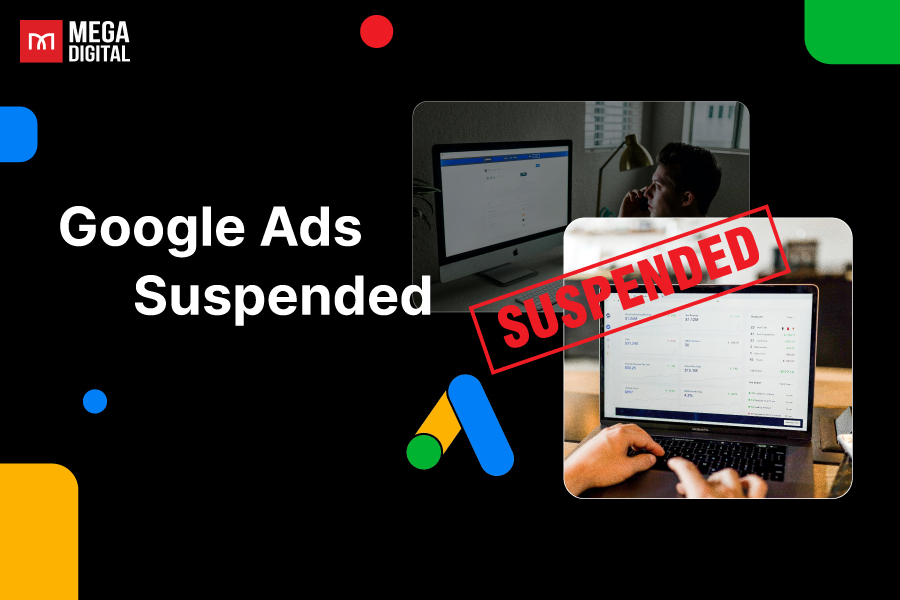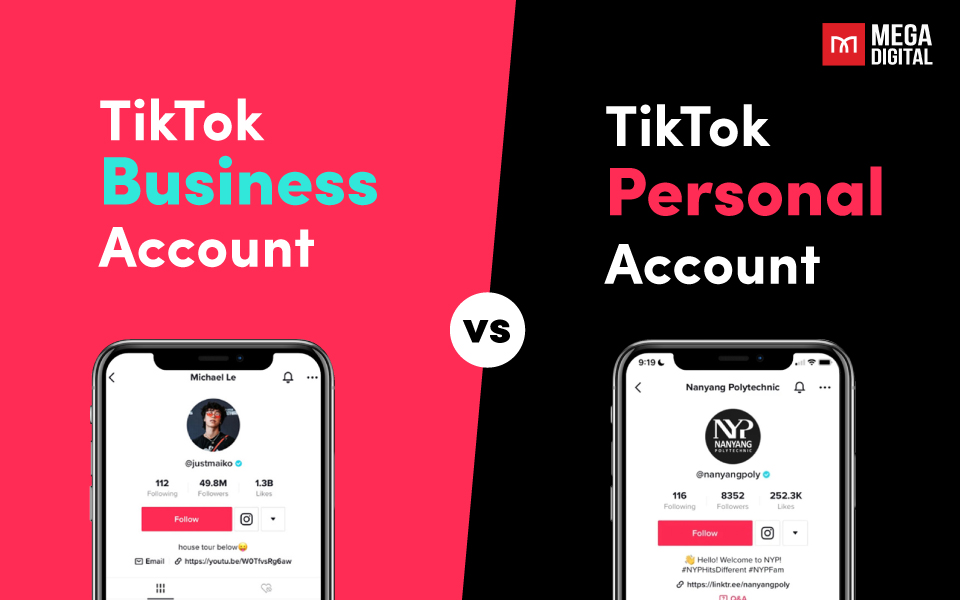Are you grappling with ads that fail to resonate with your desired audience? Yet, fear not – Facebook Ads Keywords are here to transform your campaigns. These keywords enable you to reach audiences actively seeking offerings akin to yours, ensuring maximum conversion potential. In this article, we’ll dissect the essence of keywords for Facebook Ads, provide keyword search tools, and unveil expert methodologies to curate high-impact keyword lists.
Understanding Exactly about Facebook Ads Keywords
As a Facebook Ads advertiser, you surely know the significance of reaching the right audiences with your campaigns. However, unlike search engine ads, where users actively search for specific terms, Facebook ads operate in a browsing and discovery environment. This is where Facebook ad keywords come into play. They act as a bridge between your ideal audience and your ad content. Let’s explore essential knowledge of Facebook Ad Keywords.
Here’s where things differ from traditional search engine keyword targeting:
- Focus on Interests vs. Search Intent: Facebook Ads Keywords target users based on their interests, demographics, and behaviors on the platform, not necessarily their immediate search queries.
- Broader Targeting Options: While search engines prioritize exact keyword matches, Facebook Ads Keywords offer different match types (Broad, Phrase, Exact) to reach a wider audience with varying levels of relevance.
- Leveraging Facebook’s Data Arsenal: Facebook boasts a treasure trove of user data. Facebook Ads Keywords tap into this data to identify users who have shown interest in related topics, even if they haven’t explicitly searched for them.
Now, let’s delve into 3 types of Facebook Ads Keywords to equip you with the right tools for the job:
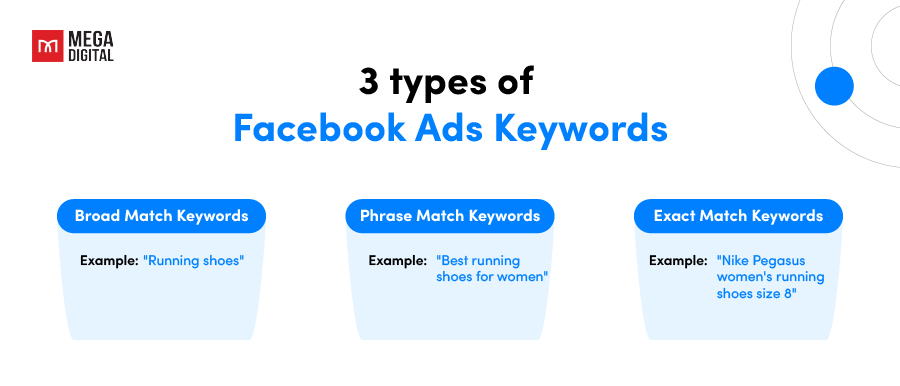
- Broad Match Keywords: These Facebook Ads Keywords are the most expansive, reaching users whose searches contain any form of your keyword. Great for initial audience discovery but can lead to irrelevant impressions. Example: “Running shoes”
- Phrase Match Keywords: Offer a more focused approach. Users’ searches must contain your exact phrase, but with additional words before or after. Example: “Best running shoes for women”
- Exact Match Keywords: These Facebook Ads Keywords provide the highest level of control. Facebook users search precisely to match your keyword, offering the most targeted reach, but potentially limiting audience size. Example: “Nike Pegasus women’s running shoes size 8”
Remember, understanding these different match types is crucial for building effective Facebook Ads Keyword lists. We’ll explore how to do just that in the next section!
5 Steps to Research Facebook Ads Keywords
Now that you’re armed with the knowledge of Facebook Ads Keyword types, let’s dive into the exciting world of research! Here, we’ll unveil a step-by-step approach to identifying powerful keywords that will propel your campaigns toward success.
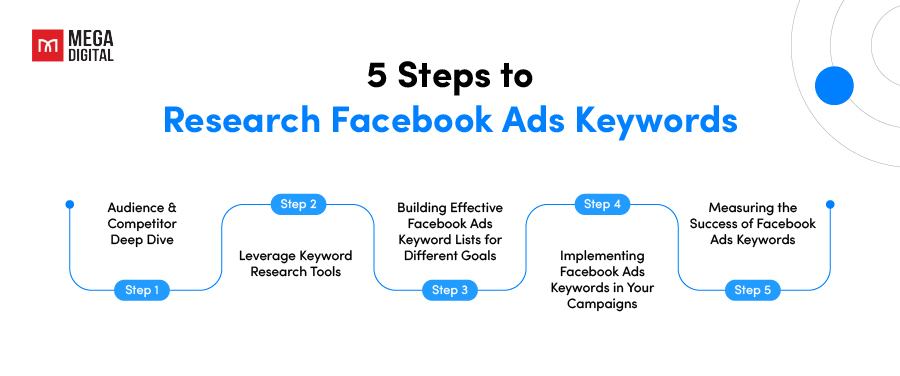
Step 1: Audience & Competitor Deep Dive
This is the first crucial step in your Facebook Ads Keywords research journey. It involves a deep dive into two key areas:
- Understanding Your Target Audience:
- Begin by clearly identifying who your target audience is. Consider factors such as demographics, interests, behaviors, and location. This will help you understand the type of keywords you should be targeting.
- Besides, you can use Facebook Audience Insights is a powerful tool that provides valuable information about your target audience. Access Audience Insights through your Facebook Ads Manager and explore the various data points available. This information will help you understand the language and keywords your audience uses.
- Based on your target audience and the nature of your business, brainstorm a list of relevant topics that align with your products, services, or industry. For example, if you run a fitness apparel store, relevant topics could include “workout clothing,” “fitness accessories,” or “gym attire.”
- Competitive Analysis:
- Identify your top competitors. Utilize tools like Facebook Audience Insights or social listening platforms to uncover the keywords they’re using in their ads and content.
- Study the ads of your competitors or businesses in your industry. Analyze the language and keywords they use in their ad copy. This can give you insights into popular keywords in your niche and help you identify gaps or opportunities for your campaigns.
We’ve combined the initial audience definition and competitor analysis steps into one as they are often intertwined. Understanding your target audience informs the keywords you brainstorm, while competitor analysis helps identify relevant keywords they might be using.
Step 2: Leverage Keyword Research Tools
Utilize keyword research tools to expand your list of relevant topics into a comprehensive set of Facebook Ads Keywords. Some popular tools include:
Free Tools
Facebook Audience Insights
Facebook Audience Insights is a worthy keyword research tool. Here’s how to dig deeper:
- Interests Tab: Explore the “Interests” section within Audience Insights. Search for interests relevant to your target audience and analyze the “People who like this also like” section. This reveals related interests and potentially new keyword themes.
- Behaviors Tab: Don’t neglect the “Behaviors” tab within Audience Insights. Here, you can explore purchase behaviors, device usage, and other valuable information about your existing audience. This data can inform keywords related to specific user actions and buying habits.
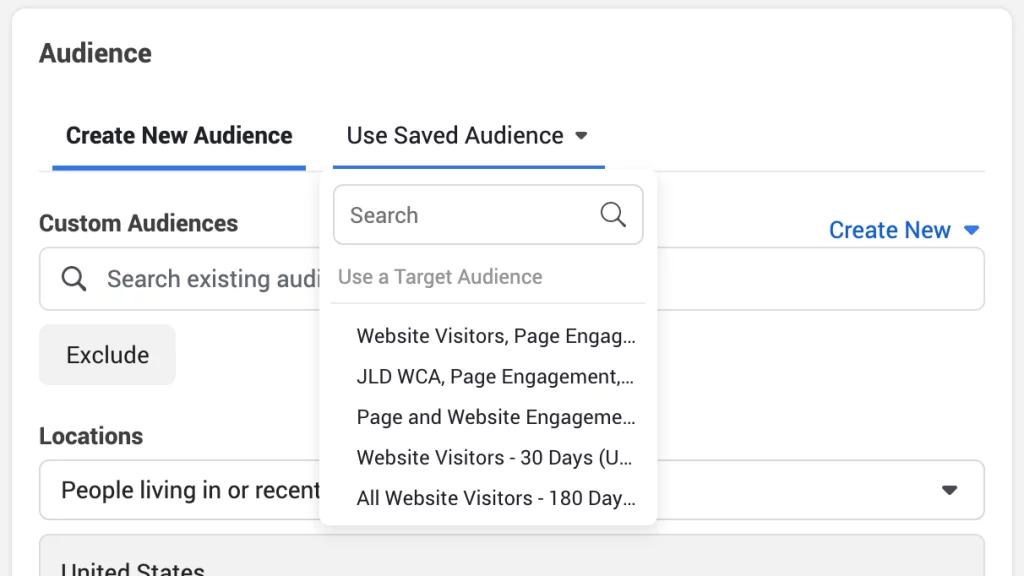
Facebook Saved Audiences
Utilize Facebook Saved Audiences as a testing ground for keyword research. Create Saved Audiences based on different demographics, interests, and behaviors.
Then, within the “Targeting Details” section of each audience, Facebook suggests potential keywords related to your chosen criteria. Analyze these suggestions and incorporate relevant options into your broader keyword research strategy.

Facebook Search Suggestions
While not a direct keyword research tool, Facebook’s search bar offers valuable hints. Start typing Facebook Ads Keywords related to your product/service and observe the search suggestions that appear. These suggestions can spark new keyword ideas and reveal user search trends within the platform itself.
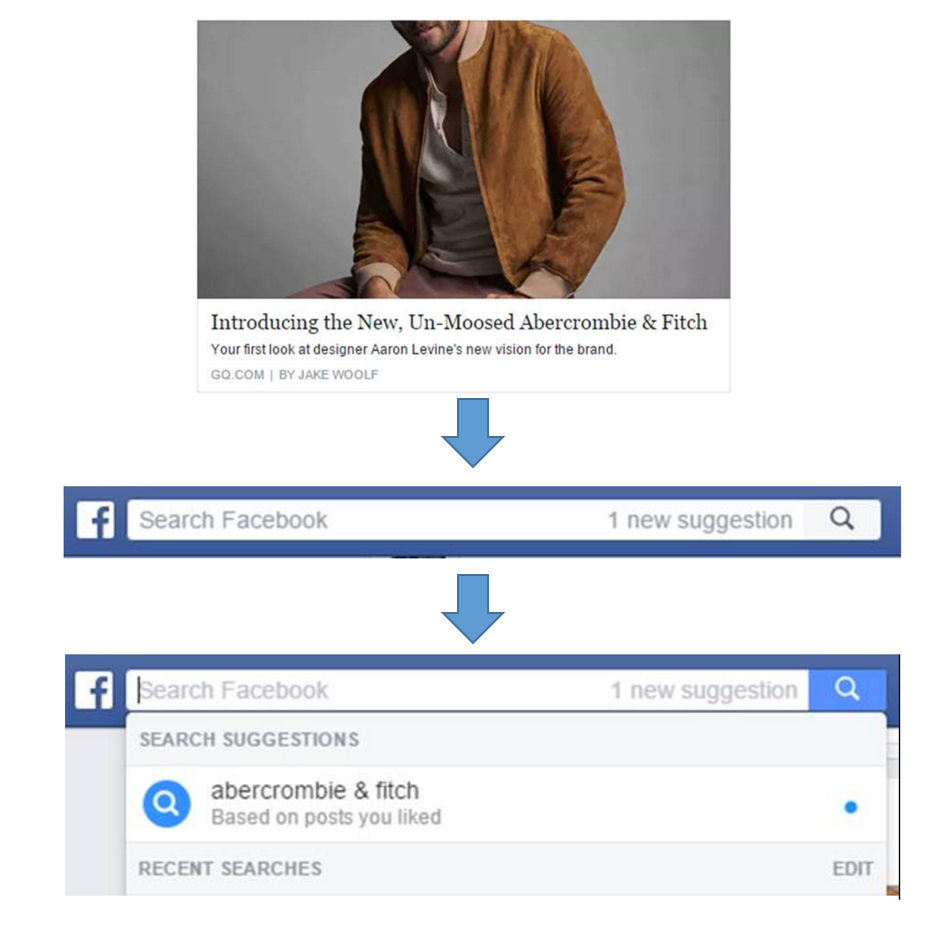
Facebook Ad Library
Facebook Ad Library is a publicly accessible database of all active ads on Facebook. It allows you to search for ads by keyword, business name, or page name. By exploring the ad copy of successful advertisers in your industry, you can gain insights into the Facebook Ads Keywords they are targeting and incorporate them into your campaigns.
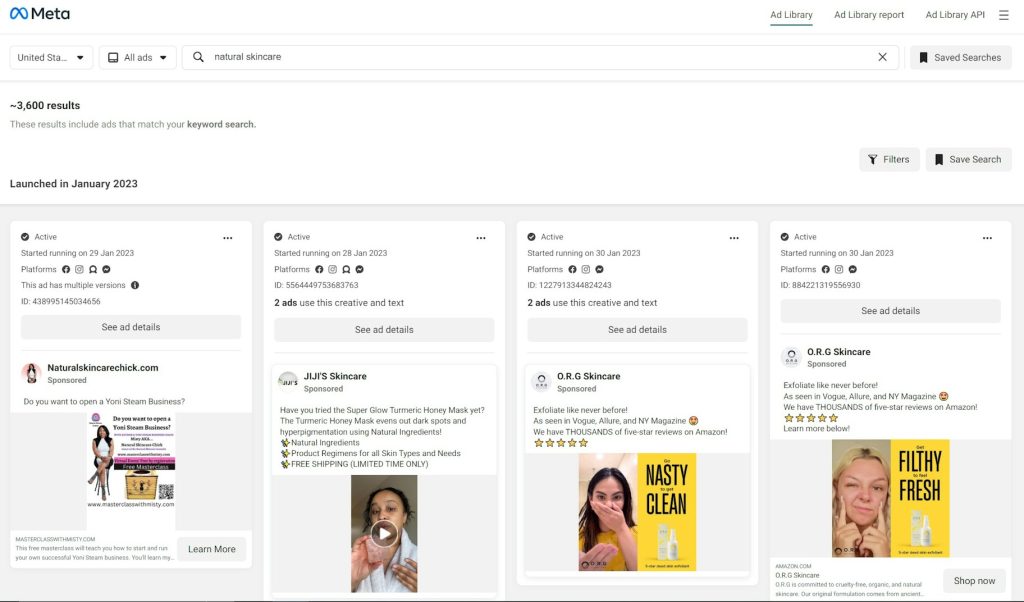
Google Keyword Planner
While not specifically designed for Facebook Ads, Google Keyword Planner can still be a valuable tool.
Use it to brainstorm broader keyword themes related to your product/service and identify search volume estimates. Remember to filter the results by location to ensure relevance to your target audience.
Paid Tools
SEMrush
SEMrush provides a comprehensive suite of SEO and PPC tools, including in-depth keyword research capabilities. Explore related keywords, search volume estimates, and competition levels to prioritize the most effective keywords for your Facebook Ads campaigns.
Socialbakers
Go beyond Facebook Ads and delve into your competitors’ broader social media presence. Socialbakers offers insights into their keyword usage across different platforms, content themes, and audience engagement strategies. This holistic view can help you identify broader trends and refine your Facebook Ads keywords targeting.
SpyFu
Gain a peek behind the curtain of your competitors’ Facebook Ads Keywords strategies. SpyFu allows you to see the keywords they’re using in their ad campaigns, along with historical data and ad variations. This can be a great way to identify high-performing keywords and uncover gaps in their approach.
Step 3: Building Effective Facebook Ads Keyword Lists for Different Goals
It’s time to craft effective Facebook Ads Keyword Lists. Remember, the key is to leverage different match types to achieve the perfect balance between reach and relevance for your specific campaign goals. Here’s how to strategically build your lists:
Choosing the Right Match Type
- Broad Match: Ideal for initial audience discovery, reaching users whose searches contain any form of your keyword (e.g., “running shoes”). Great for generating a broad initial audience pool, but can lead to irrelevant impressions. Use sparingly and monitor performance closely.
- Phrase Match: Offers a more focused approach. Users’ searches must contain your exact phrase, but with additional words before or after (e.g., “best running shoes for women”). This provides a good balance between reach and relevance. Start with a solid base of phrase-match keywords.
- Exact Match: Provides the highest level of control. Users’ searches must precisely match your keyword (e.g., “Nike Pegasus women’s running shoes size 8”). Perfect for targeting users with high purchase intent, but can limit your audience size. Use strategically for brand-specific keywords or high-value product searches.
Building Lists for Different Campaign Goals
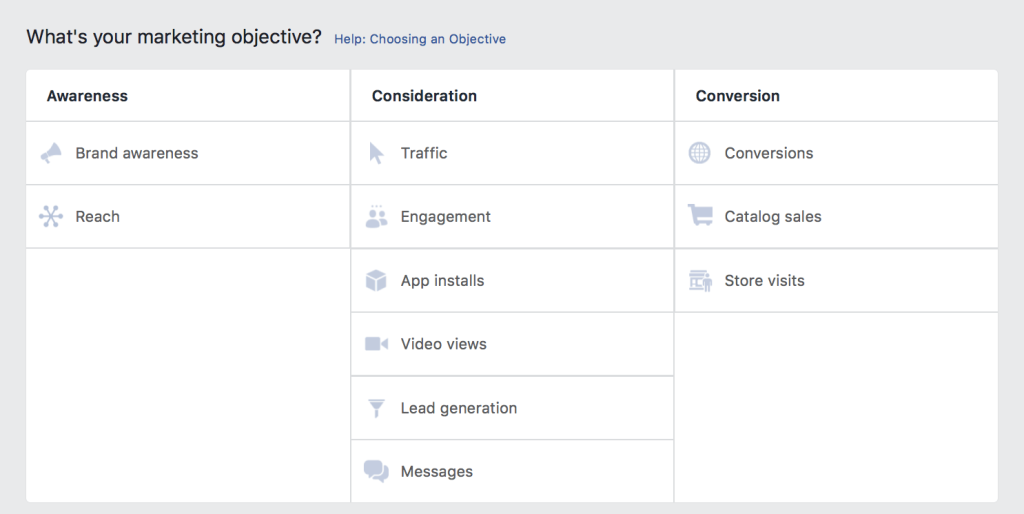
- Brand Awareness: Focus on broad-match keywords related to your brand name, industry, or product category. This helps increase brand visibility and reach a wider audience who might not be actively searching for your product yet.
- Consideration: Here, a mix of phrase match and broad match keywords is ideal. Target keywords related to the benefits and features of your product/service, as well as the user pain points you solve.
- Conversions/Sales: Prioritize high-intent keywords with exact and phrase matches. Target keywords related to specific product details, purchase intent phrases (“buy now”, “discount”), and competitor brand names (to capture users actively considering alternatives).
Pro Tip:
- Embrace Long-Tail Keywords: Long-tail keywords are longer, more specific phrases that target a narrower audience. These might have lower search volume, but they offer laser-focused targeting and often indicate users with higher purchase intent.
For example, instead of targeting the broad keyword “fitness,” you could target “best running shoes for marathon training.”
- Prioritize Keywords: Once you have a comprehensive list of keywords, prioritize them based on relevance and potential impact. Consider factors such as search volume, competition, and the alignment of the keywords with your ad objectives. Focus on keywords that have a reasonable search volume and are most likely to convert.
Step 4: Implementing Facebook Ads Keywords in Your Campaigns
Here’s a step-by-step implementation guide:
- Accessing the Targeting Settings:
- Within Facebook Ads Manager, navigate to your desired campaign and head over to the “Ad Set” level.
- Click on the “Targeting” section, where the keyword magic happens.
- Selecting Targeting Options:
- Facebook offers various targeting options beyond keywords.
- However, for keyword-based targeting, focus on the “Detailed Targeting” section.
- Adding Keywords and Choosing Match Types:
- Click “Interests” within “Detailed Targeting”.
- Select “Behaviors.” Here’s where you’ll add your meticulously researched keywords.
- Utilize the dropdown menu beside each keyword to choose the appropriate match type (Broad, Phrase, Exact) based on your targeting goals.
- Building Your Audience: Facebook allows you to combine keyword targeting with other demographics, interests, and behaviors to further refine your audience. This ensures your ads reach the most relevant users poised for conversion.
- Leverage Negative Keywords:
- Utilize the “Exclude” section within “Detailed Targeting” to add negative keywords.
- These act as filters, preventing your ad from reaching users searching for irrelevant terms that won’t convert (e.g., “free,” “used”).
Step 5: Measuring the Success of Facebook Ads Keywords
You’ve launched your Facebook Ads campaign armed with powerful keyword targeting. But the journey doesn’t end there! Now comes the crucial step of measuring success and optimizing your targeting for peak performance. Here’s how to translate clicks and impressions into valuable insights:
- Selecting the Right Metrics: Facebook Ads Manager provides a treasure trove of data. However, for measuring the success of your Facebook Ads keywords, focus on these key metrics:
- Reach: This metric shows the number of unique users who saw your ad. While a high reach is desirable, ensure it translates to relevant users.
- Impressions: This reflects the total number of times your ad was displayed. Monitor impressions alongside other metrics to assess cost efficiency.
- Clicks: This indicates how many users clicked on your ad. While clicks are important, analyze the click-through rate (CTR) for a more accurate picture (clicks divided by impressions). A high CTR suggests your ad resonates with your target audience.
- Conversions: This is the ultimate metric for sales or lead generation campaigns. Track the number of users who completed your desired action after clicking your ad (e.g., purchases, sign-ups).
- Analyzing Keyword Performance: Within Facebook Ads Manager, navigate to your campaign’s “Ads” or “Ad Sets” section. Here, you can view a breakdown of performance data for each keyword.
- Identifying Top Performers: Identify Facebook Ads Keywords driving the most clicks, and conversions and achieving the best cost-per-conversion. After that, allocate more budget to these top-performing keywords and consider expanding on them with similar long-tail variations.
- A/B Testing Match Types: Utilize Facebook’s A/B testing feature to experiment with different match types for the same keyword. See which combination (Broad, Phrase, or Exact) yields the best results for your specific goals.
Based on the data you gather, refine your keyword strategy over time to optimize your campaigns for better results.
6 Tips to Optimize Facebook Ads with Facebook Ads Keywords
Having mastered the fundamentals of Facebook Ads Keywords targeting, let’s explore some advanced strategies to squeeze even more performance out of your campaigns:
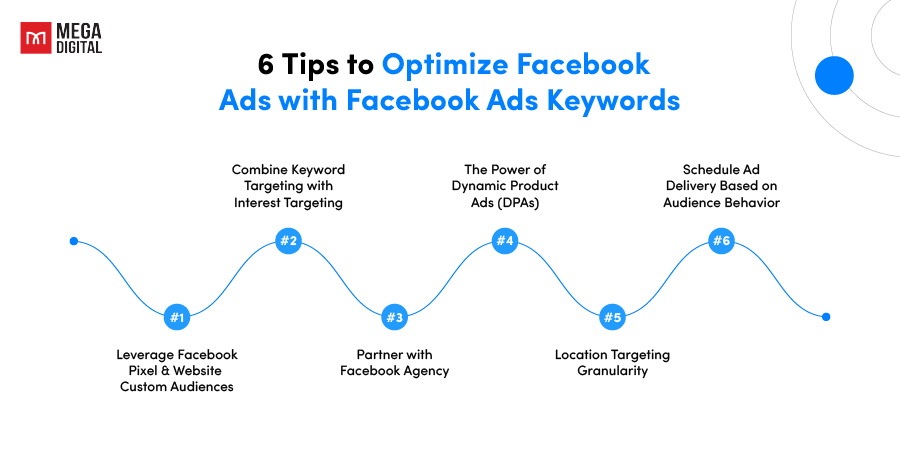
#1. Leverage Facebook Pixel & Website Custom Audiences
The Facebook Pixel is a powerful tool that tracks user behavior on your website or landing page after clicking your ad. Utilize this data to create Website Custom Audiences.
- Retargeting: Target users who have already interacted with your website or landing page but haven’t converted. Craft specific ad messages tailored to their previous actions.
- Lookalike Audiences: Based on your existing high-performing customer base, Facebook can create Lookalike Audiences – new audiences with similar characteristics. Target these Lookalike Audiences with keywords likely to resonate with potential customers who share traits with your best customers.
#2. Combine Keyword Targeting with Interest Targeting
Don’t limit yourself to keywords alone! Combine them with Facebook’s robust interest-targeting options.
For instance, target users interested in “running shoes” and who have also shown interest in specific running brands or fitness apps. This refines your audience and ensures your ad reaches highly relevant users.
#3. Partner with Facebook Agency
Partnering with a Facebook agency to optimize Facebook ads with keywords offers numerous advantages:
- These agencies leverage their expertise to strategically select relevant keywords, ensuring your ads resonate with your target audience.
- They excel in crafting compelling ad content seamlessly by integrating chosen keywords while continuously refining campaigns based on performance metrics.
- Additionally, agencies efficiently allocate budgets, prioritizing high-performing keywords to maximize ROI.
- By staying updated with Facebook’s changes, they ensure campaigns remain effective and compliant.
- Entrusting your campaigns to professionals saves time and resources, allowing you to focus on other aspects of your business.
Furthermore, when you partner with Mega Digital, we will provide you Facebook Ad Agency Account, which help you:
- Use various tools and features within the platform, specifically tailored to facilitate the management, organization, and optimization of advertising efforts on behalf of clients.
- Operate with high-profile account, distributed by Facebook.
- Limit mistakes leading to ad rejection or account suspension, such as policy violations.
#4. The Power of Dynamic Product Ads (DPAs)
For e-commerce campaigns, leverage Dynamic Product Ads (DPAs). DPAs automatically generate personalized ads showcasing products from your product catalog based on user behavior and interests. Incorporate relevant keywords within your product descriptions to further optimize targeting within DPAs.
#5. Location Targeting Granularity
Facebook Ads Manager allows for granular location targeting. Go beyond targeting entire cities or countries. Location targeting specific neighborhoods, zip codes, or even areas within a certain radius of your physical store location (if applicable). Combine this with location-specific keywords to hyper-target your audience.
#6. Schedule Ad Delivery Based on Audience Behavior
People are more receptive to ads at certain times of the day or days of the week. Analyze your audience insights to identify peak browsing times. Schedule your ad delivery to coincide with these times to maximize reach and engagement.
Final Word
Mastering Facebook Ads keywords unlocks a treasure trove of potential customers. By combining in-depth research with powerful tools, you can craft targeted campaigns that resonate with your audience. Strategically choose match types, leverage additional targeting options, and continuously optimize for peak performance. With dedication and the power of keywords, your Facebook Ads will become a high-performance engine driving real business results.







